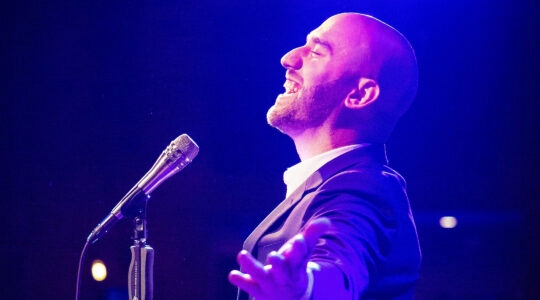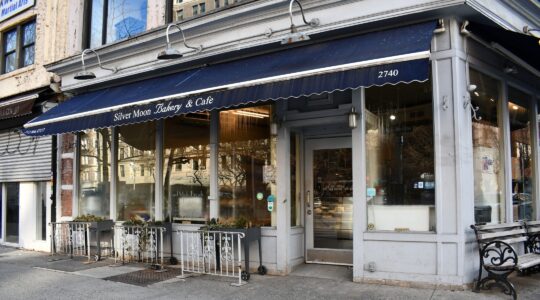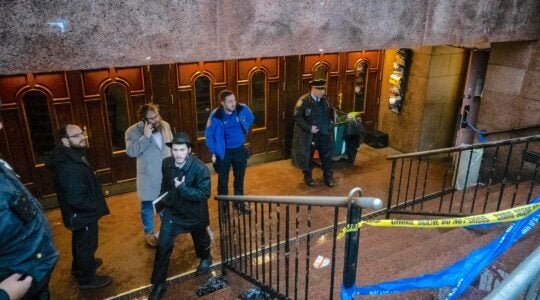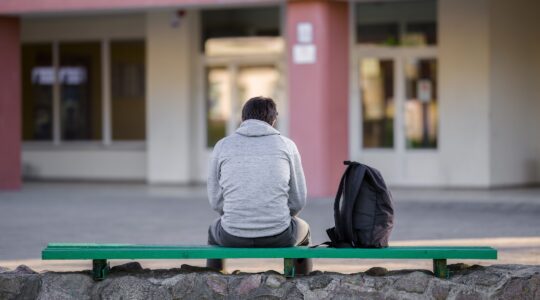The Salute to Israel Parade is the greatest parade in New York. Itís rooted in religious virtues, thereís no rowdiness from too much beer, you can bring the kids and remind yourself why we all fell in love with Jews and being Jewish in the first place.Tell me about all the other parades, where the men dance the mambo on the sidewalks; where the Cardinal comes out on the steps of his cathedral; where bagpipes bleat the music of the mist. Pete Hamill said the women at the Puerto Rican Day Parade dress ìin gowns out of fairy tales and soap operas and bad movies.î No, we donít have anything like that. We dress in our fashion, like something out of the History Channel, maybe, but no less beautiful for that. We love education, and we march and cheer for our principals as they walk down the street.Hereís the real greatness of our parade: Come the dying of the day, most of us leave feeling better about Israel than any time since, well, the last Israel parade.For four hours we had an Israel day where there were no rockets and retreats, no Abu Dis, no incitement. We had 70,000 of what seemed like our sweetest elementary and high school students marching with their principals and teachers, waving placards about blessings, lighting candles, and the flags of the countries that said yes to Israel in 1948. Alisa Flatow and Sara Duker once were young on a day like this, and this is where they live on.Across a spectacular blue sky, a skywriter spelled out ìDougieís.î At 75th Street, blue, red, orange, purple and yellow helium balloons made a great arc across Fifth Avenue. From every silver lamppost, a pair of Israeli flags and American flags flapped in a breeze. ìJudge Gorgeousî (Lee B. First) waved like a blond movie queen as she glided on the float of Minyan of the Stars.Students pushed a papier mache man with black beard, white tallit and turban. A man walked on stilts. Yeshiva girls did cartwheels. College students from Hillel tossed candy at children waving from the sidewalk.Beautiful, but thereís trouble in paradise.
Post-Zionism, debunking the foundation legends of Israel, a trend supported by the Israeli Ministry of Education, has eroded the inner logic of the parade. News from the Middle East, be it from Lebanon or religious feuds within Israel, has demoralized Jews from every camp. Critics say the parade itself is about as spontaneous as a school assembly, and without the parents and grandparents watching from the sidelines thereís no parade at all. Money is scarce, corporate sponsorships are few, and personal donations and volunteers are not enough to keep the year-round parade office open for business.By contrast, the upcoming Puerto Rican Day Parade ran a 135-page insert crammed with ads in the Sunday Daily News. Last year, said Hamill in an online report, the Puerto Rican Day Parade had floats sponsored by ìfood companies and radio stations and English-language morning newspapers.î There was nothing like that for Israel.
According to Judy Kaufthal, a prolific community activist who volunteers as president of the Israel Tribute Committee, the group that runs the parade, the Israel parade was $75,000 in the red on a budget of $500,000 as the parade began.
The Israel parade, said Kaufthal, is New Yorkís ìbest-kept secret. Support for the parade runs basically on private contributions, ìbut thatís not enough. We have some corporate sponsors, such as Continental Airlines, who pay for the floats, but itís a shame that there are these Nasdaq and Internet companies that do business with Israel, making a bundle, and not giving us money.îKaufthal works as hard as she does because she remembers how this parade thrilled her as a young girl in the 1960s and í70s. ìI remember the cheering and happiness for Israel,î she said. ìItís always been a great day. Itís nice that we have a parade like everyone else. If nothing else, the parade is a wonderful place for kids to meet, for Jewish awareness and celebration. Thatís why I work so hard. I donít want to lose it. Itís really in danger. Everyone takes it for granted.îCrowds at the Salute to Israel Parade were sparse, only slightly more, it seemed, than in recent years. Organizers said the parade attracts ìmore than 500,000,î but letís do the math: The parade route was just 22 blocks, several blocks shorter than its previous apogee. The official estimate comes to an average of 22,700 on every block ó the size of a full house at Madison Square Garden. Yet, empirically, there were blocks where the crowd wasnít more than one or two deep along the barricades. Maybe there were 1,000 on every block, which is 22,000 onlookers in all.There were an estimated 60,000 marchers in the middle of the avenue. When the school marchers met up with their parents, that swelled the sidewalks, as well. The only real logjam was at 72nd Street, where thousands were streaming to an Israel Day Concert sponsored by pro-Likud nationalists.Alvin Schiff, former executive of the Board of Jewish Education and one of the founders of the parade in the 1960s, admitted that the parade has lost some vibrancy.
ìOur parade has become too usual, too normal,î said Schiff. ìIn the old days weíd rent the armory on Lexington Avenue and brought in the Israel Army Band to keep the party going. We had 80,000 people in and out of the armory from after the parade until 9 oíclock at night. We had the largest kosher cake ever baked in New York, and 15,000 people had a piece of Israelís birthday cake. Those were special times.ìNow the stories out of Israel are negative: You donít read about Jews building a homeland but you keep seeing a Palestinian looking over a fence from Lebanon, saying ëThereís where I lived. Thatís where my familyís from.í It wears people down. People say, ëNuch a mol, Israel again? Letís move on to something else.íìPost-Zionism,î said Schiff, ìhas undoubtedly eaten into some of the Jews who used to be hot Zionists. When you keep telling Jews that weíre not so great, then youíre not putting them in the mood for a parade. Zionist youth groups arenít as strong as they used to be.îSteven Bayme of the American Jewish Committee questions the inroads of post-Zionism, but he adds the trend ìis terribly demoralizing, particularly for Jews like myself who are really committed to the enterprise. I donít think itís penetrated the Jewish street, but the logic of post-Zionism would be a kind of end to the Salute to Israel Parade.î
One thing has stayed the same, said Schiff. ìThe day-school kids who are marching are still hepped up. It means a lot to them. The Zionist yeshivas have that old-time spirit.îZev Brenner, president of Talkline Communications, has been marching in the parade, or attending it, since the 1970s. He warns that the lack of publicity has reached a nadir.
ìThere used to be a time Iíd get a call from the parade to get me to do a feature on the air, or to interview someone,î said Brenner, who has the highest-rated Jewish radio and TV programs (WMCA radio and WPXN-TV). ìThe last few years I havenít even gotten a call ó zilch. Not even a letter or press release. The parade shows up with absolutely no momentum.ìLast year I was sitting on the podium and I saw a lot less local politicians than I ever saw before. This year thereís a hot Senate race, but why arenít Bush and Gore here in an election year?îRuth Kastner, one of the parade organizers, confirmed that no invitation was extended to the presidential candidates, Al Gore or George Bush.
Yuri Yanover, an Israeli, said heíd never go to the parade. A former correspondent for Yediot Achronot, the Israeli daily, Yanover said, ìIím so against it. If we cannot find any other unifying occasion than Israel, if we canít find anything local to celebrate, then we are bankrupt. Not that we should shun Israel, God forbid.îYanover, who edits and publishes USAJewish.com, a Web site containing links to international newspapers, admits that ìIf Iím on Eastern Parkway on Labor Day, Iím a little jealous of what the Caribbeans have. Their parade is gorgeous! All the greens and yellows and blacks and reds along the sidewalk, just the beauty of that. We just donít produce crowds like that. Have we become so sterile?îBayme observes that the parade has declined, in part, as a reflection of ìthe trend in American Jewish life to privatize Jewish identity. The fascination with spirituality, which has been all the rage in certain sectors, is not going to translate into support for the public ethos of collective Jewish peoplehood.ìThe parade is also a barometer of the fissure between those for whom Judaism is at the center of their lives and those for whom itís not. Those who are resentful of Orthodox Jews and Orthodox initiatives at securing continuity and identity increasingly see the parade as Orthodox turf.îSo the great secular, intermarried mass wonít show up at something like this?ìAbsolutely. You canít divorce feelings toward Israel from the broader assimilationist phenomenon in American Jewish life,î Bayme said. ìWhatís happened is that those who are the least interested in Judaism are also the least interested in Israel.îKaufthal acknowledges that ìoutwardly it appears to be more of an Orthodox parade.î But, she adds, ìthatís not for our lack of trying.
Everybodyís invited to the party but not everybody comes.îThe old-time religious Zionists still come. The theme of the parade was ìTime.î The SAR Academy in Riverdale saluted Jerusalem ìfor all time.î The Yeshiva of North Jersey carried the bikkurim fruit of Shavuot, the time of Sinai. Manhattan Day School invoked the liturgical phrase ìBayamin Ha-Haym, Bazman Hazeh,î in those days, in these times, with banners of Sinai, the Temple and slavery (in those days) and a dove, a map of Israel including the West Bank, and soldiers entering Jerusalem in the Six-Day War (in these times).Mothers, marching with their childrenís schools, pushed strollers ó Jewish babies just beginning their time.The class of 2000 from Rocklandís Reuben Gittelman School wore T-shirts: ìWe had the time of our lives.î
From the sidelines, Sara Noa, a third-grader, couldnít wait to be a fourth-grader so she could march, too.Elana, a 6-year-old in kindergarten, watched the parade and then looked up at her mother to say, ìI love being Jewish.î
That alone makes the parade more of a success than most people know.
The New York Jewish Week brings you the stories behind the headlines, keeping you connected to Jewish life in New York. Help sustain the reporting you trust by donating today.




